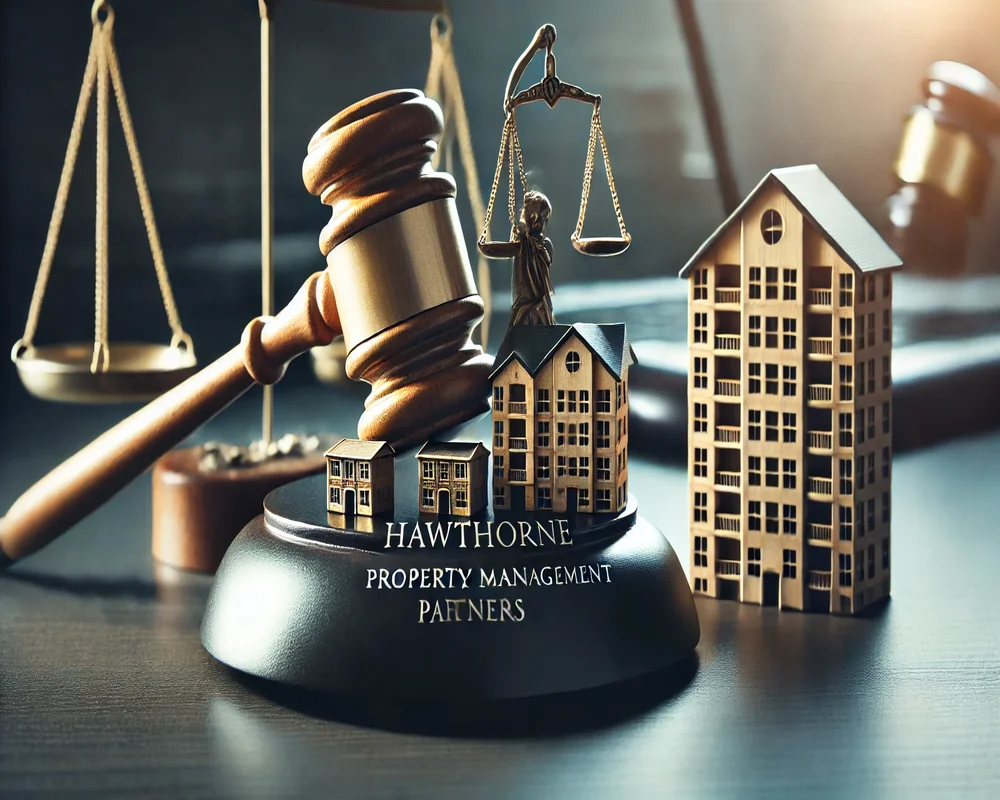The Hawthorne Residential Partners lawsuit stands out as one of the most important legal cases in recent property management history, though such lawsuits rarely draw industry-wide attention. The case has triggered widespread discussions about tenant rights and property management responsibilities in multiple jurisdictions.
Employee feedback and recent reviews on Glassdoor point to growing concerns within the industry. Legal experts actively track the case developments, even though the lawsuit settlement amounts remain private. The ongoing legal analysis looks at the key allegations, proceedings, and what they mean for the property management sector.
This deep dive into the legal challenges reveals the core issues and reviews how the case might shape future industry practices. Property management professionals will better understand this case’s importance and its lasting effects on standard practices.
Understanding the Hawthorne Residential Partners Legal Challenges
The legal situation at Hawthorne Residential Partners shows a complex pattern of lawsuits in different courts. Several major cases have emerged over the last several years that highlight the challenges this property management company faces.
Overview of filed lawsuits
The company deals with many legal challenges, from personal injury claims to tenant disputes. Sheila Jacque filed a personal injury lawsuit against Hawthorne Residential Partners, LLC in the U.S. District Courts, Louisiana Middle District Court in September 2021. Blaise Lanzi also filed a complaint against both Hawthorne Residential Partners LLC and White Eagle Property Group LLC.
Key allegations and claims
Legal claims against Hawthorne Residential Partners include several key areas:
- Property safety violations and personal injury claims, as shown in the Daniels case, where allegations focused on premises safety and dangerous conditions
- Contract breach allegations about property maintenance standards
- Tenant rights violations and property management disputes
One of the most important cases involved Geraldine Daniels, who sued the company after getting injured on their property. Her case raised questions about property maintenance standards and safety protocols.
Jurisdictional scope
Legal proceedings have spread across multiple courts, which shows how widespread these challenges are. Cases appear in various locations:
- U.S. District Courts, Louisiana Middle District
- Gwinnett County, GA Superior Courts
- Alabama Supreme Court
Different jurisdictions have interpreted property management responsibilities and tenant rights differently. The Alabama Supreme Court looked at specific questions about property management duties and premises liability in the Daniels case. These court proceedings have created important precedents about property management responsibilities and tenant safety obligations.
These legal challenges have led to closer examination of property management practices and safety protocols. The cases show how property management law continues to evolve and why clear safety standards matter across different jurisdictions.
Analysis of Primary Legal Issues
Legal cases against Hawthorne Residential Partners show complex patterns of liability and responsibility in property management law. Property managers and residents share a relationship that centers around negligence claims and contractual obligations.
Contract breach allegations
Many claims are based on alleged breaches of duty of care. The Watts v. Rivarel LLC case is 8 years old and shows that successful negligence claims need four key elements:
- The defendant’s duty of care to the plaintiff
- Breach of that duty
- Proximate cause of injuries
- Actual injury occurrence
Commercial dispute elements
The specific nature of relationships between parties shapes property management cases. Courts recognize different classifications that determine duty of care:
- Invitee Status: Property owners must exercise reasonable care for their business visitors’ safety
- Landlord-Tenant Relationship: Courts see a key difference between landlord/tenant and store owner/invitee relationships
The Daniels case explored these commercial elements in premises liability claims. The plaintiff claimed that Hawthorne-Midway and management failed “to ensure that the premises were reasonably safe for tenants”.

Legal precedents in property management cases
Recent court decisions have created important precedents about property management responsibilities:
- Campbell v. Valley Garden Apartments: Determined that “a landlord has the duty to maintain common areas in a reasonably safe condition”
- Turner case: Protected tenant rights regarding maintenance responsibilities, especially when defects are reported
Courts consistently stress that property managers must show reasonable care in maintaining premises safety. The McDonald case saw the Court of Civil Appeals address how landlord’s knowledge of hazards matters.
These legal precedents create guidelines for property management companies to balance their contractual duties with care responsibilities. Ongoing litigation continues to shape property management law and protect tenant rights.
Legal Proceedings and Court Developments
Legal records paint a complex picture of proceedings that span jurisdictions in Hawthorne Residential Partners’ case history. The judicial timeline reveals changes that altered the map of the company’s legal standing.
Timeline of major court actions
The sequence of legal events started at the time Daniels filed suit against Hawthorne-Midway in August 2018. The plaintiff claimed unsafe premises conditions. The case moved through these stages:
- Original filing and discovery phase (August-December 2018)
- Summary judgment motion (August 2019)
- Court hearing and final ruling (September 2019)
The legal landscape shifted again when Trina Davis submitted her complaint in May 2019. This case continued through several phases until September 2020.
Judicial decisions and orders
Several vital rulings by the courts shaped these cases’ direction. The Alabama Supreme Court backed the summary judgment that favored Hawthorne-Midway in the Daniels case. The court found that the plaintiff couldn’t prove genuine issues of material fact.
The court made these key decisions:
- September 24, 2019: Hawthorne-Midway won summary judgment
- October 25, 2019: Court denied motion to alter judgment
- September 11, 2020: Davis case’s FLSA settlement received final approval
Settlement negotiations
Settlements have been a vital part of resolving these disputes. The Davis case saw the court help with multiple settlement phases:
- Parties filed the original settlement notice
- Both sides submitted joint motion for approval
- Court granted final settlement approval with dismissal
Court documents show successful outcomes in several cases through well-laid-out settlement talks. To cite an instance, parties in one class action reached an agreement through “extensive, arm’s length negotiations.” The court approved this settlement on May 26, 2023.
Recent cases show ongoing efforts to resolve disputes through arbitrated settlements. Courts actively help these discussions. The process typically needs preliminary approval, notice periods for affected parties, and final approval hearings to ensure fair claim resolutions.
Impact on Property Management Law
Legal developments in property management have created major waves throughout the industry. The Hawthorne Residential Partners cases set new standards for operational standards and compliance requirements.
Precedent-setting aspects
These legal proceedings established several significant precedents for property management operations. The court’s interpretation of Fair Housing Act compliance created new standards, especially about familial status discrimination in rental practices. Property managers must now follow:
- Uniform, non-discriminatory standards for application processing
- Transparent waiting list procedures
- Objective approval criteria for rental applications
- Documented notification processes
Industry compliance implications
This litigation triggered substantial changes in industry compliance requirements. Property management companies need detailed documentation of their rental policies and procedures. The court requires these policies to be:
- Posted prominently in rental offices
- Made available upon request to applicants
- Applied equally to all prospective tenants
- Regularly reviewed and updated
Privacy protection measures became vital as companies needed to secure personal information from “accidental loss and unauthorized access”.
Risk management lessons
These cases highlighted key risk management considerations for property management firms. Hawthorne’s experience showed why robust business intelligence matters in decision-making processes. The company’s property management approach now includes:
Enhanced Oversight Measures:
- Regular financial and operational audits
- Detailed asset-specific business planning
- Stronger management oversight across disciplines
This litigation altered industry-wide data handling practices. Companies must follow strict protocols that protect tenant information while maintaining transparency in their operations. The balance between data protection and operational transparency has become the life-blood of modern property management risk mitigation.
Training requirements changed too, with courts requiring documented attendance for compliance training programs. These developments altered how property management companies handle tenant relations, maintenance protocols, and operational procedures.
Property management firms across the country now adapt their practices to match these legal precedents. They focus particularly on tenant privacy protection and fair housing compliance. The industry moved toward more structured operational frameworks, and companies now implement detailed risk management strategies to avoid similar legal challenges.
Legal Defense Strategies and Responses
Hawthorne Residential Partners has built sophisticated legal strategies to handle multiple legal challenges that showcase property management litigation complexities. Their approach to legal matters reflects careful thought about immediate defense needs and future business impact.
Company’s legal position
Hawthorne Residential Partners manages to keep a consistent legal stance based on property management law principles. The company won the Daniels case by successfully arguing they had no legal duty because mud on the sidewalk created an “open and obvious” condition the plaintiff knew about. The court granted summary judgment that favored their defense strategy.
Standard industry practices strengthen the company’s position. Hawthorne emphasizes managerial discretion in several cases, especially noting that “managerial employees are liable for torts in which they have personally participated”.
Defense arguments presented
The legal team at Hawthorne builds defense arguments around several key principles:
- Contributory negligence claims against plaintiffs
- Open and obvious danger doctrine application
- Assumption of risk by tenants
- Lack of personal liability for management staff
- Absence of evidence supporting wantonness claims
The Keosha Johnson case led to a structured settlement agreement that addressed current concerns and future implications. The settlement, executed on May 16, 2023, showed the company’s readiness to solve disputes while protecting their legal position.
Settlement approaches
Hawthorne displays strategic flexibility in settlement approaches, particularly in class action resolutions. Their settlement strategy follows a well-laid-out process:
- “Extensive, arm’s length negotiations” with plaintiffs
- Development of detailed settlement agreements
- Implementation of clear payment structures
- Establishment of specific class definitions
- Creation of both cash settlement funds and debt relief options
A recent class action settlement created a USD 500,000 Cash Settlement Fund and gave Debt Relief worth USD 2,776,916.62. The settlement structure had specific provisions for different class members:
- Eviction Fee Class members got approximately USD 50.00 each
- Collection Letter Class members could receive USD 20.00 per letter, up to USD 60.00 maximum
The company balances vigorous litigation with strategic settlement negotiations when needed. This balanced approach helps manage legal challenges and maintains operational stability effectively.
Hawthorne Residential Partners Lawsuit Frequently Asked Questions
What is the nature of the lawsuit against Hawthorne Residential Partners?
The nature of the lawsuit against Hawthorne Residential Partners typically revolves around allegations related to tenant rights, property management issues, or contractual disputes. Lawsuits may also involve claims such as discrimination, unfair business practices, or failure to maintain habitable living conditions in the company’s managed properties. The specifics of the case would depend on the plaintiff’s complaint and the circumstances surrounding the alleged violations.
How can I find more information about the Hawthorne Residential Partners lawsuit?
To find more information about the lawsuit, you can check public court records, which are often available through local government websites or legal databases. Additionally, news outlets may provide updates if the lawsuit is of significant public interest, or the company’s press releases may offer insights. Consulting a legal professional for details on ongoing cases might also be helpful.
What are the potential outcomes of the lawsuit against Hawthorne Residential Partners?
The potential outcomes of the lawsuit can range from a settlement, where the company agrees to resolve the matter without going to trial, to a court decision that could result in damages or other legal penalties. In some cases, the lawsuit could be dismissed if the claims are deemed insufficient. The outcome would depend on the strength of the evidence presented, the legal arguments, and whether the company settles the dispute.
How can I contact Hawthorne Residential Partners for more information about the lawsuit?
You can contact Hawthorne Residential Partners by reaching out to their corporate offices or customer service department. Contact information such as phone numbers, email addresses, or online contact forms may be found on their official website. Additionally, legal inquiries might be directed to their legal or public relations department for a more detailed response.
Are there any similar lawsuits involving Hawthorne Residential Partners?
Similar lawsuits involving Hawthorne Residential Partners could include those related to tenant disputes, allegations of poor maintenance, or issues with leasing practices. Searching legal databases or court records may reveal other cases involving the company. Publicly available information, such as news reports or legal filings, can also provide details on whether similar issues have been raised against the company in the past.




